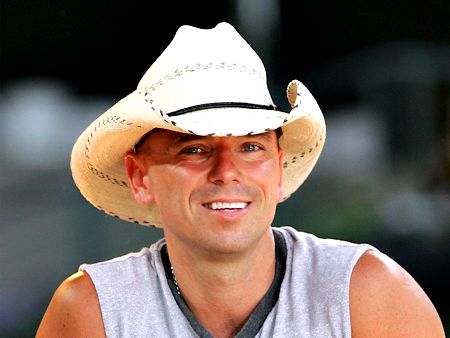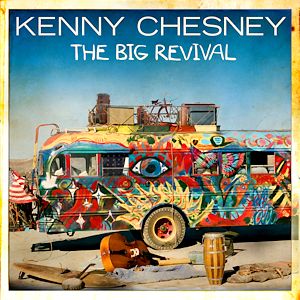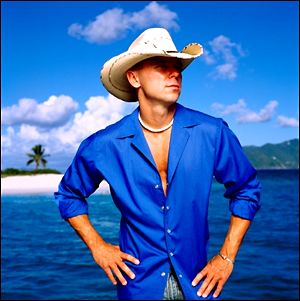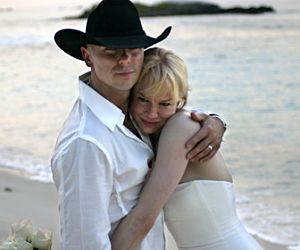DAVE'S DIARY - 29 DECEMBER 2014 - KENNY CHESNEY CD REVIEW
2014 CD REVIEW
KENNY CHESNEY
THE BIG REVIVAL (BLUE CHAIR-COLUMBIA.)
KENNY CHESNEY TAKES AMERICAN KIDS ON HIS BUS
“We were Jesus save me, blue jean baby/ born in the USA, trailer park truck stop/ faded little map dots, New York to LA/ we were teenage dreaming, front seat leaning / baby, come give me a kiss/ put me on the cover of the Rolling Stone/ uptown down home American kids/ growing up in little pink houses/ making out on living room couches/ blowing that smoke on a Saturday night/ a little messed up, but we're all alright/ Baptist church parking lot, trying not to get caught.” - American Kids - Rodney Clawson-Shane McAnally-Luke Laird.
 |
When Tennessean superstar Kenny Chesney released his American Kids video he illustrated it with a school bus daubed with magical mystery imagery, also practiced by The Beatles.
The bus, dominated by reds, blues and yellows dominates, also adorns the cover of Chesney's 16 th album The Big Revival (Blue Chair-Sony.)
There's also an upright bass lying on its side with percussion instruments nearby, a banjo sits to the left of the bass, sitting on top of an old surf board.
Two old bicycles, more percussion instruments and suitcase sit atop the bus and American flags hang inside and along the rear with more bicycles on a carrier near the U.S. flag.
Cartoonish figures illustrate the bus with a big eyeball with a blue iris and black pupil.
"I wanted a cover that was surprising that suggests anything is possible,” Knoxville born Chesney, now 46, revealed.
“No matter where you are in your life, how tired or lost or demoralized, with a little faith and a little help, anything's possible. Because it's all within you. Or me."
The idea is that the bus becomes a transport to a world where everyone can explore their potential and celebrate being alive.
That's Chesney's philosophy - one that enabled him to sell more than 30 million albums in his 20 year plus career that started in the late Chet Atkins hometown Luttrell in rural east Tennessee and spread his empire to the Virgin Islands, Caribbean and way beyond.
Chesney has an expansive Mediterranean-style hilltop home south of Nashville.
But this year, when not working on The Big Revival , he took some time off to visit his grandmother, who still lives in Luttrell.
The son of an elementary school teacher father and hairdresser mother was a keen high school athlete, especially in football.
Music became a big part of his life after he received a cheap guitar for Christmas in the late 1980s.
"My mom sings, so does my Aunt Sharon," he says.
"So I thought, 'Maybe I should accompany myself and see what happens.' All of a sudden, I was playing weekends at a fraternity house in Johnson City and at a lot of bars."
After graduating from East Tennessee State University in 1990 with a marketing and advertising degree he headed to Nashville and begin the requisite gigging at the Lower Broadway clubs, mostly at a now-closed honky-tonk known as The Turf .
Chesney didn't write American Kids but identified with the multi-tempo ode to youth.
He's been the teenage boyfriend whom the dad didn't like, made out with the girl in the church parking lot on Sunday and then lied to his friends at football practice about how far the lust went.
"I think those things are universal," Chesney revealed.
"The songs are different today than they were then, but people still live their lives the same way and the music still has a way of connecting the dots of all those people's lives. When I heard American Kids I knew I was going to be able to compete with myself and win because that is different and there aren't many of those songs in any genre."
THE BIG REVIVAL
“Get ready for the big revival/ everybody get in the van/ there's a little church on Eagle Mountain/ it's called The Blood of the Blessed Land/ if your faith ain't strong enough, child, you might wind up dead/ praise the Lord and pass me a Copperhead/ now Reverend Jones, he struts and dances/ while the guitar plays Amazing Grace/ he testifies in tongues of fire/ with tears of joy running down his face/ he ain't sure and we ain't sure exactly what he said/ but praise the Lord and pass me a Copperhead/ you won't find many hypocrites that'll take the chance on getting bit/ but a true believer can survive rattlesnakes and cyanide.” - The Big Revival - Dennis Linde.
 |
Chesney resurrected a leap of faith song from late prolific writer Dennis Linde as entrée title track of his album - it's also a fitting focus. “To me The Big Revival is about reclaiming one's life, your place in the world, your passion, your state of mind where one pushes off the bottom and reaches for something more,” Chesney says. “It's finding that something inside of you that something inside of you that can waked up your soul. That can help you to restart, replenish, reset and revive your life. It's about listening to that inner voice that tells you to push the limits to be better than you've been at living your life with passion and conviction.” |
That inner voice and a few others persuaded Chesney to can the first version of the album buried in the mists of time and tin-pan alley.
“It's everything I wanted to feel when I decided to back away, but that all had to start with the music,” Chesney revealed.
“I had to protect that investment with the fans and this wonderful connection that we have. I think time off really allowed me to make a record with a clear head, with a new energy, with a sense of grabbing my audience by the hand and bringing them along with me to places I wanted them to go.”
Buddy Cannon, who also produces Shotgun Willie Nelson, elaborated.
“Kenny called me up and he said ‘This isn't the record I want,'” Cannon said of the album they threw on the trash heap.
“Red dirt, tailgates, he didn't want to do it. He and I both love great songs, and they are hard to find.”
ROCK BOTTOM
“I tried to hang but the Hank wasn't tough enough/ couldn't twang the pain with the Flatt & Scruggs/I had to keep on drinking, keep on sinking down, down, down to the good stuff/ till I hit rock bottom/ this old hillbilly playing Stardust Willie ain't even getting off the ground/ tried to hang with the Hag but I had to stop/ got shot with the J. Cash needle drop/ I couldn't Walk The Line, so I just kept shinin' down down down/ till I hit rock bottom.” - Rock Bottom - Craig Wiseman-Matt Dragstrem.
Chesney exorcises his penchant for amplifying his country roots with rock instrumentation in sentiments of Craig Wiseman tune Rock Bottom.
Chesney expanded on that in his criticism of the Bro-Country fad clogging country radio waves in a Billboard interview.
“Over the last several years, it seems like anytime anybody sings about a woman, she's in cutoff jeans, drinking and on a tailgate - they objectify the hell out of them,” Chesney said.
“Twenty years ago, I might have written a song like that - I probably did. But I'm at a point where I want to say something different about women.”
This sentiment isn't new for Chesney.
While promoting The Big Revival he spoke specifically about how country treats women in the context of his song Wild Child - a duet with Grace Potter.
“But Wild Child is telling some girl out there that's got dreams, that's a free spirit, who's smart and interesting, that she has a chance, that she is worthy,” Chesney explained of a pathos primed pastiche of a wayward wench.
“All the women that have been in my life, they all had this idea of the wild child in them. I think it's an important song, because it's saying that they don't have to be this one thing that's been sung about over and over again recently. And I'm proud of that, that we wrote a song that lifts up a woman in that way.”
FLORABAMA AND LIQUID ALL SORTS
“Sitting here at the Flora-Bama/ bout to open up a big old can of good times, unwind/ fall in and out of love in the same night/ can't say I got a whole lot of cares/ I'm in the red neck Riviera/ it's getting crazy, getting hammered/ sitting right here at the Flora-Bama/ at the Flora-Bama/ there's high tide, low tide, years of history/ hurricanes with different names that almost took the beach/ sign that says live your life just for inspiration/ gonna raise a lot of hell tonight in the, in the no shoes nation.” - Flora-Bama - Kenny Chesney-Ross Copperman-David Lee Murphy.
This is a riveting rebirth of a career sprouted from humble roots to calypso and reggae and hedonistic celebration of life Till It's Gone and Drink It Up - referring to life not liquor.
 |
But Florabama - celebration of a famed bar - is more specific. Chesney performed a free concert in the bar and on the beach for aquatic fans in filming his video - locale of his only 2014 concert. He performed at Flora-Bama on August 16 to preview his album - he also wrote previous song Coastal about the bar. It's located on Perdido Key in Pensacola, Florida, adjacent to Alabama/Florida border and world famous honky-tonk, oyster bar, beach bar, and Gulf Coast cultural landmark, touted as being America's Last Great Roadhouse. |
The Flora-Bama is named after its locale on the Florida-Alabama border line - it lies in both Alabama and Florida with the bar sitting right on the line.
It was constructed in 1964 two years after Alabama State Route 182 connected Orange Beach, Alabama, with Perdido Key, Florida was completed.
Escambia County, Florida, in which it is located was wet, while across the border Baldwin County, Alabama, was dry.
In 1978 Flora-Bama was sold to Joe Gilchrist and Pat McClellan, who share ownership with John McInnis and Cameron Price who joined up in 2009.
It's referred to as the Bama , and before its partial destruction by Hurricane Ivan , boasted 20 bars where four live bands could play simultaneously providing a wide array of music.
The bar is primarily outdoors, and before Hurricane Ivan , offered a huge deck for eating and drinking with panoramic views of the Gulf of Mexico.
In 2010 it was rebuilt from hurricane damage using most materials from the original bar destroyed by Hurricane Ivan in 2004.
Jimmy Buffett song Bama Breeze was written about this roadhouse but his video for the song was made at the ruins of The Firedog Saloon in Bay St. Louis, Mississippi, another popular beach bar destroyed by Hurricane Katrina in 2005.
March tourist Chris Young's song Lighters in the Air , Blake Shelton's Good Ole Boys and Jason Aldean's Tattoo's on this Town featured the bar.
It's more edible than Beer Can Chicken that tastes more like a Zac Brown or Jimmy Buffett offcut but is a reminder to embrace the "little things that make life worth living."
More reflective is balladic Don't It - a song about how life controls you not the reverse - and aquatic escapism from heartbreak in Save It For A Rainy Day.
IF THE CHESNEY BUS COULD TALK
“He was there when I started, in Knoxville, Tennessee/ opening for Patty Loveless, November of '93/ full of friends, mom, and uncle Butch/ and the crowd was really small/ he'd say I was a scared kid, if this bus could talk/ some nights we'd dance with the devil/ some nights we'd pray to the Lord/ between vibrant passes and margarita glasses/ he was never really bored/ we were starry eyed dreamers, bouncing off the wall/ and all the stories he could tell, if this bus could talk.” - If This Bus Could Talk - Kenny Chesney-Tom Douglas.
 |
The album and ends with evocative highlight - If This Bus Could Talk - one of four tunes co-written by Chesney. It's a passionate paean from his 1993 touring debut when he opened for another Kentucky coal-miner's daughter - Patty Loveless. “It's a very truthful and authentic song about our journey,” Chesney says of the song name checking Patty Loveless, learning the code of the road and a hurricane party in Virginia that he still holds as one of his favorite memories. |
Chesney was supposed to play an amphitheatre in Virginia Beach several years ago but cancelled because of a hurricane.
The storm missed the area, but the town was drenched in heavy rain so Chesney and road crew made most of it.
"We made homemade Slip 'N Slides and rum punch," says the singer, whose four month marriage to actress Rene Zellweger, ended in annulment in 2005.
"For hours we went down the grass at the amphitheatre, and the people at the building were so ticked off at us because we were messing up everything. It's all those small moments like that - having your own hurricane party with your band and crew - that you don't see coming and that doesn't necessarily mean anything as it's happening. But over the years, they start to add up to meaning everything, and this song is a celebration of all of those moments."
And the singer's hungry for longevity.
"I still have a fire in my belly," says Chesney who may belatedly tour Australia in 2015.
"I'm very appreciative of what God has given me, and I want to constantly see where that will take me. I think that's why I work hard. That and fear of failure. I sincerely hope I haven't written my best song yet."
CLICK HERE for a previous story on Kenny in the Diary on May 20, 2013.